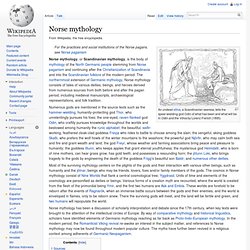

Baldr. "Each arrow overshot his head" (1902) by Elmer Boyd Smith.
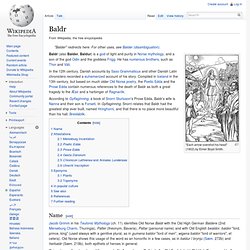
Baldr (also Balder, Baldur) is a god of light and purity in Norse mythology, and a son of the god Odin and the goddess Frigg. He has numerous brothers, such as Thor and Váli. In the 12th century, Danish accounts by Saxo Grammaticus and other Danish Latin chroniclers recorded a euhemerized account of his story. Compiled in Iceland in the 13th century, but based on much older Old Norse poetry, the Poetic Edda and the Prose Edda contain numerous references to the death of Baldr as both a great tragedy to the Æsir and a harbinger of Ragnarök.
Name[edit] Jacob Grimm in his Teutonic Mythology (ch. 11) identifies Old Norse Baldr with the Old High German Baldere (2nd Merseburg Charm, Thuringia), Palter (theonym, Bavaria), Paltar (personal name) and with Old English bealdor, baldor "lord, prince, king" (used always with a genitive plural, as in gumena baldor "lord of men", wigena baldor "lord of warriors", et cetera). Attestations[edit] Dagr. In Norse mythology, Dagr (Old Norse "day"[1]) is day personified.
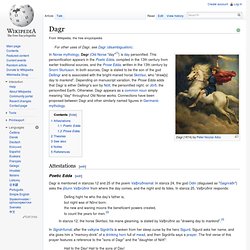
This personification appears in the Poetic Edda, compiled in the 13th century from earlier traditional sources, and the Prose Edda, written in the 13th century by Snorri Sturluson. In both sources, Dagr is stated to be the son of the god Dellingr and is associated with the bright-maned horse Skinfaxi, who "draw[s] day to mankind". Depending on manuscript variation, the Prose Edda adds that Dagr is either Dellingr's son by Nótt, the personified night, or Jörð, the personified Earth. Otherwise, Dagr appears as a common noun simply meaning "day" throughout Old Norse works. Connections have been proposed between Dagr and other similarly named figures in Germanic mythology. Attestations[edit] Poetic Edda[edit] Dagr is mentioned in stanzas 12 and 25 of the poem Vafþrúðnismál. Freyr. Freyr (sometimes anglicized Frey, from *frawjaz "lord"[1]) is one of the most important gods of Norse paganism.
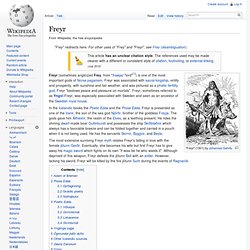
Freyr was associated with sacral kingship, virility and prosperity, with sunshine and fair weather, and was pictured as a phallic fertility god, Freyr "bestows peace and pleasure on mortals". Freyr, sometimes referred to as Yngvi-Freyr, was especially associated with Sweden and seen as an ancestor of the Swedish royal house. In the Icelandic books the Poetic Edda and the Prose Edda, Freyr is presented as one of the Vanir, the son of the sea god Njörðr, brother of the goddess Freyja.
The gods gave him Álfheimr, the realm of the Elves, as a teething present. He rides the shining dwarf-made boar Gullinbursti and possesses the ship Skíðblaðnir which always has a favorable breeze and can be folded together and carried in a pouch when it is not being used. Adam of Bremen[edit] Prose Edda[edit] Gylfaginning[edit] The woman is Gerðr, a beautiful giantess. Skaldic poetry[edit] Sól (sun) Sól (Old Norse "Sun")[1] or Sunna (Old High German, and existing as an Old Norse and Icelandic synonym: see Wiktionary sunna, "Sun") is the Sun personified in Germanic mythology.
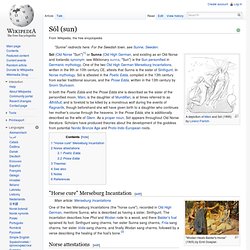
One of the two Old High German Merseburg Incantations, written in the 9th or 10th century CE, attests that Sunna is the sister of Sinthgunt. In Norse mythology, Sól is attested in the Poetic Edda, compiled in the 13th century from earlier traditional sources, and the Prose Edda, written in the 13th century by Snorri Sturluson. In both the Poetic Edda and the Prose Edda she is described as the sister of the personified moon, Máni, is the daughter of Mundilfari, is at times referred to as Álfröðull, and is foretold to be killed by a monstrous wolf during the events of Ragnarök, though beforehand she will have given birth to a daughter who continues her mother's course through the heavens.
In the Prose Edda, she is additionally described as the wife of Glenr. "Wodan Heals Balder's Horse" (1905) by Emil Doepler. Norse mythology. An undead völva, a Scandinavian seeress, tells the spear-wielding god Odin of what has been and what will be in Odin and the Völva by Lorenz Frølich (1895)
